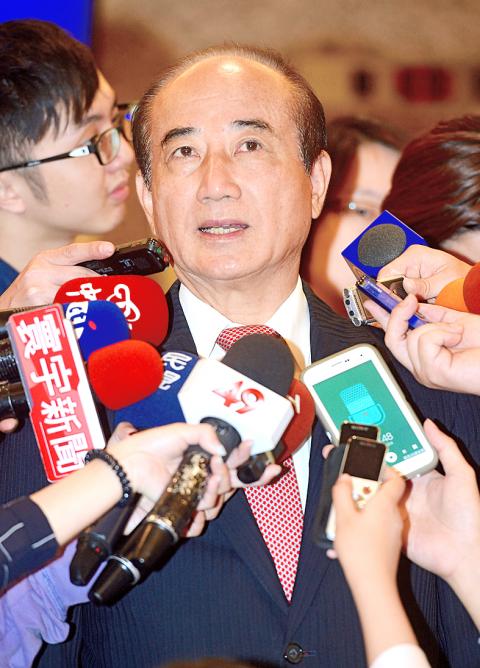The Chinese Nationalist Party’s (KMT) Central Standing Committee yesterday passed a motion to lift a self-imposed term limit on legislator-at-large seats for legislative speakers, opening the door for Legislative Speaker Wang Jin-pyng’s (王金平) potential re-election for a fourth term.
The proposal, jointly submitted by five committee members, was passed with the signatures of 29 of the 39 members, without being put to a vote at a routine meeting of the committee in Taipei.
The motion recommends an amendment be made to Article 2 of the KMT’s regulations on nominations for legislators-at-large and overseas legislators, which stipulates that KMT legislators-at-large are generally allowed to serve one term, but those with special contributions to the party are eligible for re-election.

Photo: Lo Pei-der, Taipei Times
The last paragraph of the article — dubbed the “legislative speaker clause” — states that KMT members who meet the above criteria and also serve as legislative speakers are entitled to a third term as a legislator-at-large.
The “legislative speaker clause” was added to the regulations in October 2011, before the end of Wang’s second term as legislator-at-large, for the apparent sole purpose of allowing him to retain his role for a third consecutive term.
Wang first assumed the speakership in 1999.
Under the new amendment, KMT legislative speakers who fulfil requirements would be exempted from the three-term limit.
“The legislative speakership is held by a legislators-at-large whose power and influence are accorded by their party. As such, their neutrality and authority might be compromised and questioned if their party can strip them of their position at will … or block their re-election bid by imposing a term limit,” the motion stated.
“In an effort to let the party’s legislative speaker fulfil duties without distractions, we propose that the committee make an amendment to the nomination regulations for legislators-at-large,” it added.
KMT spokesperson Lin Yi-hua (林奕華) said the committee did not discuss any specific KMT member or the party’s potential legislator-at-large candidates for the Jan. 16 elections at the meeting.
Prior to the meeting, KMT presidential candidate Eric Chu (朱立倫) said ensuring neutrality in the speakership was one of the three legislative reforms he plans to push for, if he wins the presidential race.
“The other two planned reforms include improving the efficiency of the legislature and improving transparency in legislative negotiations,” Chu said.
None of the three reforms would be affected because of a single individual, Chu said.
“My objective is to establish a long-term system. Any KMT members who disapprove of, or refuse to accept, these pending changes will not be nominated by the party as its candidates,” he added.
Wang said on the sidelines of an event in Taipei that the passage of the motion indicated support from leaders of both the KMT and the Democratic Progressive Party for a neutral legislative speaker and a reformed legislature.
“The public also looks forward to seeing these plans become a reality,” Wang said.

CHAOS: Iranians took to the streets playing celebratory music after reports of Khamenei’s death on Saturday, while mourners also gathered in Tehran yesterday Iranian Supreme Leader Ayatollah Ali Khamenei was killed in a major attack on Iran launched by Israel and the US, throwing the future of the Islamic republic into doubt and raising the risk of regional instability. Iranian state television and the state-run IRNA news agency announced the 86-year-old’s death early yesterday. US President Donald Trump said it gave Iranians their “greatest chance” to “take back” their country. The announcements came after a joint US and Israeli aerial bombardment that targeted Iranian military and governmental sites. Trump said the “heavy and pinpoint bombing” would continue through the week or as long

TRUST: The KMT said it respected the US’ timing and considerations, and hoped it would continue to honor its commitments to helping Taiwan bolster its defenses and deterrence US President Donald Trump is delaying a multibillion-dollar arms sale to Taiwan to ensure his visit to Beijing is successful, a New York Times report said. The weapons sales package has stalled in the US Department of State, the report said, citing US officials it did not identify. The White House has told agencies not to push forward ahead of Trump’s meeting with Chinese President Xi Jinping (習近平), it said. The two last month held a phone call to discuss trade and geopolitical flashpoints ahead of the summit. Xi raised the Taiwan issue and urged the US to handle arms sales to

BIG SPENDERS: Foreign investors bought the most Taiwan equities since 2005, signaling confidence that an AI boom would continue to benefit chipmakers Taiwan Semiconductor Manufacturing Co’s (TSMC, 台積電) market capitalization swelled to US$2 trillion for the first time following a 4.25 percent rally in its American depositary receipts (ADR) overnight, putting the world’s biggest contract chipmaker sixth on the list of the world’s biggest companies by market capitalization, just behind Amazon.com Inc. The site CompaniesMarketcap.com ranked TSMC ahead of Saudi Aramco and Meta Platforms Inc. The Taiwanese company’s ADRs on Tuesday surged to US$385.75 on the New York Stock Exchange, as strong demand for artificial intelligence (AI) applications led to chip supply constraints and boost revenue growth to record-breaking levels. Each TSMC ADR represents

State-run CPC Corp, Taiwan (CPC, 台灣中油) yesterday said that it had confirmed on Saturday night with its liquefied natural gas (LNG) and crude oil suppliers that shipments are proceeding as scheduled and that domestic supplies remain unaffected. The CPC yesterday announced the gasoline and diesel prices will rise by NT$0.2 and NT$0.4 per liter, respectively, starting Monday, citing Middle East tensions and blizzards in the eastern United States. CPC also iterated it has been reducing the proportion of crude oil imports from the Middle East and diversifying its supply sources in the past few years in response to geopolitical risks, expanding